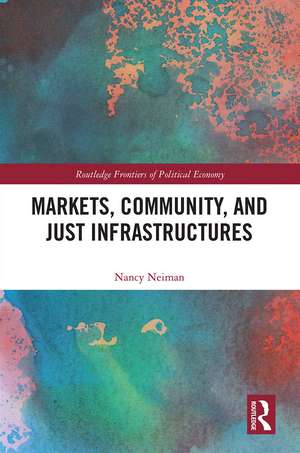Markets, Community and Just Infrastructures: Routledge Frontiers of Political Economy
Autor Nancy Neimanen Limba Engleză Paperback – 29 apr 2022
Through a variety of case studies – labor relations in the U.S. meatpacking industry, the globalization process in Juaìrez, Mexico, financial reform in Cuba, and an interfaith Ugandan coffee cooperative – this book provides a framework for understanding the conditions under which markets promote just or unjust outcomes (e.g., discrimination, income inequality, environmental degradation, or racial justice, human rights, and equitable growth). This book touches on subject matter as varied as food, religion, banking, and race and gender equality, from a multi-disciplinary perspective. It offers an analysis of markets based on community rather than pure individualism that has the potential to change the way we think about economic rationality.
An accessible and compelling read, this book will appeal to students and scholars in political science, economics, sociology, geography, gender studies, critical race studies, environmental studies, and all those interested in the critique of mainstream economics and neoliberal logic.
| Toate formatele și edițiile | Preț | Express |
|---|---|---|
| Paperback (1) | 256.13 lei 6-8 săpt. | |
| Taylor & Francis – 29 apr 2022 | 256.13 lei 6-8 săpt. | |
| Hardback (1) | 999.51 lei 6-8 săpt. | |
| Taylor & Francis – 23 iul 2020 | 999.51 lei 6-8 săpt. |
Din seria Routledge Frontiers of Political Economy
-
 Preț: 309.90 lei
Preț: 309.90 lei -
 Preț: 309.79 lei
Preț: 309.79 lei -
 Preț: 316.03 lei
Preț: 316.03 lei -
 Preț: 310.95 lei
Preț: 310.95 lei - 9%
 Preț: 866.82 lei
Preț: 866.82 lei -
 Preț: 309.12 lei
Preț: 309.12 lei -
 Preț: 311.61 lei
Preț: 311.61 lei -
 Preț: 286.99 lei
Preț: 286.99 lei -
 Preț: 327.83 lei
Preț: 327.83 lei -
 Preț: 311.87 lei
Preț: 311.87 lei -
 Preț: 302.76 lei
Preț: 302.76 lei - 9%
 Preț: 938.48 lei
Preț: 938.48 lei -
 Preț: 152.67 lei
Preț: 152.67 lei -
 Preț: 151.97 lei
Preț: 151.97 lei -
 Preț: 318.54 lei
Preț: 318.54 lei -
 Preț: 317.95 lei
Preț: 317.95 lei -
 Preț: 310.01 lei
Preț: 310.01 lei -
 Preț: 326.49 lei
Preț: 326.49 lei -
 Preț: 155.44 lei
Preț: 155.44 lei -
 Preț: 309.79 lei
Preț: 309.79 lei -
 Preț: 328.76 lei
Preț: 328.76 lei -
 Preț: 281.72 lei
Preț: 281.72 lei -
 Preț: 286.58 lei
Preț: 286.58 lei -
 Preț: 386.12 lei
Preț: 386.12 lei -
 Preț: 353.78 lei
Preț: 353.78 lei -
 Preț: 325.09 lei
Preț: 325.09 lei -
 Preț: 310.55 lei
Preț: 310.55 lei -
 Preț: 387.03 lei
Preț: 387.03 lei -
 Preț: 324.87 lei
Preț: 324.87 lei -
 Preț: 312.86 lei
Preț: 312.86 lei -
 Preț: 374.16 lei
Preț: 374.16 lei -
 Preț: 329.09 lei
Preț: 329.09 lei -
 Preț: 348.22 lei
Preț: 348.22 lei - 28%
 Preț: 1047.06 lei
Preț: 1047.06 lei - 18%
 Preț: 1169.45 lei
Preț: 1169.45 lei - 18%
 Preț: 1555.17 lei
Preț: 1555.17 lei - 18%
 Preț: 1048.43 lei
Preț: 1048.43 lei - 18%
 Preț: 1059.84 lei
Preț: 1059.84 lei - 31%
 Preț: 767.47 lei
Preț: 767.47 lei - 18%
 Preț: 731.92 lei
Preț: 731.92 lei - 28%
 Preț: 822.54 lei
Preț: 822.54 lei - 18%
 Preț: 1796.21 lei
Preț: 1796.21 lei - 29%
 Preț: 1184.91 lei
Preț: 1184.91 lei - 18%
 Preț: 1120.23 lei
Preț: 1120.23 lei - 15%
 Preț: 700.95 lei
Preț: 700.95 lei - 18%
 Preț: 1116.31 lei
Preț: 1116.31 lei - 25%
 Preț: 299.52 lei
Preț: 299.52 lei
Preț: 256.13 lei
Preț vechi: 316.95 lei
-19% Nou
Puncte Express: 384
Preț estimativ în valută:
49.03€ • 53.27$ • 41.21£
49.03€ • 53.27$ • 41.21£
Carte tipărită la comandă
Livrare economică 21 aprilie-05 mai
Preluare comenzi: 021 569.72.76
Specificații
ISBN-13: 9780367517809
ISBN-10: 0367517809
Pagini: 180
Dimensiuni: 156 x 234 mm
Greutate: 0.26 kg
Ediția:1
Editura: Taylor & Francis
Colecția Routledge
Seria Routledge Frontiers of Political Economy
Locul publicării:Oxford, United Kingdom
ISBN-10: 0367517809
Pagini: 180
Dimensiuni: 156 x 234 mm
Greutate: 0.26 kg
Ediția:1
Editura: Taylor & Francis
Colecția Routledge
Seria Routledge Frontiers of Political Economy
Locul publicării:Oxford, United Kingdom
Public țintă
Postgraduate and UndergraduateCuprins
Introduction 1.The Severing Paradigm and the Rationality of Justice 2.The US Meatpacking and the Promotion of Racist Ideology 3.Juaìrez and Globalization in the context of Neoliberal Patriarchy 4.The Cuban Reform Process Through a Neoliberal Frame 5.Marketing Community in Uganda Conclusion
Notă biografică
Nancy Neiman earned an MA in Economics and a PhD in Political Science from Yale University. She has taught at Scripps College since 1993, where she has held positions in the Politics and Economics Departments and the Mary Wig Johnson Chair in Teaching. Professor Neiman is the author of States, Banks, and Markets: Mexico’s Path to Financial Liberalization in Comparative Perspective (Westview, 2001). Her research covers a wide variety of topics, including neoliberalism, dollarization, financial crises in Latin America, fair trade coffee in Africa, alternative education in the U.S., and politics of the global food movement. Markets, Community, and Just Infrastructures represents a culmination of years of diverse and interdisciplinary teaching, research, and community engagement.
Descriere
This book explores how culture, politics, and ideology help shape market incentives in an attempt to reclaim the language of economic rationality and the policymaking legitimacy that accompanies it.
